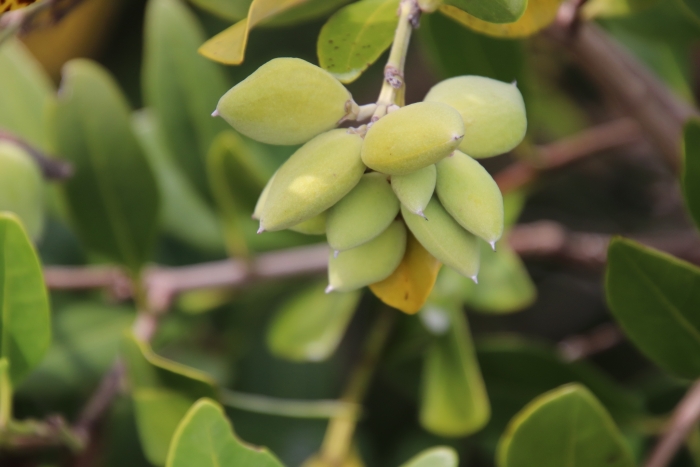Black Mangrove
(Hilairanthus germinans)
Black Mangrove (Hilairanthus germinans)
/
/

Millie Basden
CC BY 4.0
Image By:
Millie Basden
Recorded By:
Copyright:
CC BY 4.0
Copyright Notice:
Photo by: Millie Basden | License Type: CC BY 4.0 | License URL: http://creativecommons.org/licenses/by/4.0/ | Rights Holder: Millie Basden | Publisher: iNaturalist | Date Created: 2018-11-04T14:10:07-08:00 |

















































Estimated Native Range
Summary
Hilairanthus germinans, commonly known as Black Mangrove, is an evergreen tree or shrub native to coastal tidal areas, including mangrove swamps, estuaries, and brackish water wetlands in the Americas, Africa, and the Caribbean. It typically grows up to 12 meters (39 feet) tall and is well-adapted to saline environments. Black Mangrove is characterized by its unique pneumatophores, which are specialized aerial roots that allow for gas exchange in waterlogged soils. The species is recognized for its leathery leaves, which are capable of excreting salt, a distinctive adaptation to its saline habitat.
Black Mangrove is valued for its ecological role in coastal environments, where it stabilizes shorelines, provides protection against storm surges, and supports a diverse array of wildlife. It produces inconspicuous white flowers during the winter and spring, which are followed by seeds that float and can disperse over long distances by water. In cultivation, Black Mangrove requires conditions that mimic its natural habitat, including full sun exposure, high water availability, and soils with medium to slow drainage. It is not commonly used in conventional landscaping due to its specific growing requirements but is vital in restoration and conservation projects for coastal ecosystems. Care should be taken to manage this species outside of its native range to prevent potential invasiveness.CC BY-SA 4.0
Black Mangrove is valued for its ecological role in coastal environments, where it stabilizes shorelines, provides protection against storm surges, and supports a diverse array of wildlife. It produces inconspicuous white flowers during the winter and spring, which are followed by seeds that float and can disperse over long distances by water. In cultivation, Black Mangrove requires conditions that mimic its natural habitat, including full sun exposure, high water availability, and soils with medium to slow drainage. It is not commonly used in conventional landscaping due to its specific growing requirements but is vital in restoration and conservation projects for coastal ecosystems. Care should be taken to manage this species outside of its native range to prevent potential invasiveness.CC BY-SA 4.0
Plant Description
- Plant Type: Tree, Shrub
- Height: 10-30 feet
- Width: 6-25 feet
- Growth Rate: Rapid
- Flower Color: White
- Flowering Season: Winter, Spring
- Leaf Retention: Evergreen
Growth Requirements
- Sun: Full Sun
- Water: High
- Drainage: Medium, Slow
Common Uses
Bird Garden, Erosion Control, Salt Tolerant, Water Garden
Natural Habitat
Coastal tidal areas, including mangrove swamps, estuaries, and brackish water wetlands
Other Names
Common Names:
Scientific Names: , Avicennia germinans, Avicennia nitida, Hilairanthus germinans, Avicennia africana, Avicennia germinans var. germinans, Avicennia tomentosa, Avicennia germinans var. guayaquilensis, Avicennia elliptica, Avicennia germinans f. aberrans
GBIF Accepted Name: Hilairanthus germinans (L.) Cornejo